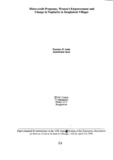Micro-credit programs, women's empowerment and change in nuptiality in Bangladesh villages
Citation
Amin, F. D., & Hadi, A. (1998, August). Micro-credit programs, women’s empowerment and change in nuptiality in Bangladesh villages. Research Reports (1998): Social Studies, Vol – XVIII, 68–82.Abstract
Although the fertility impact of micro-credit and women's empowerment programs has received increasing attention
in recent years, the role of credit-based income generating programs on nuptiality in traditional communities has
rarely been explored. This research examines how the social and cultural aspects of micro-credit programs modifies
the traditional practices of early marriages and dowry in Bangladesh villages. In-depth interviews were conducted
to collect data from the mothers of a sample of 597 recently married women living in 90 villages in the Manikganj
district of Bangladesh where numerous development agencies have been providing credit-based development
programs for the poor. Findings reveal that women's involvement in credit activities not only raises their living
standard but creates a space for them in their households that leads to a new form of cultural behavior among the
household members. The traditional nuptial practices such as early marriage appear to be diminishing while the
practices of dowry are increasing. The multivariate analysis indicates that the effect of mother's involvement in
credit-based income generating programs in raising age at marriage is positive but the newly gained cultural
behavior does not have any effect on the practice of dowry when education, land ownership and media exposure
variables are controlled. The paper argues that while the credit program has the potential not only to raise the living
standard and to some extent empower the poor, but also has freed the inherent aspirations of certain traditional
values.

